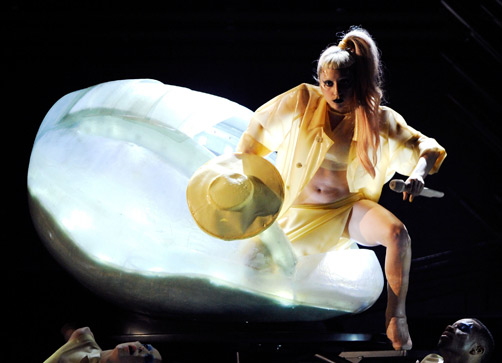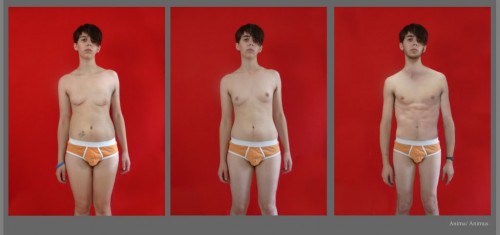It seems like the new Lady Gaga (or was it Madonna) song about being ok with our bodies regardless of our deformities is following me everywhere I go from my car radio to television to my own damned humming. While the message is, of course, a good message (Love Yourself) the image of Ms. Gaga onstage last week at the Grammys lingers for me in a somewhat different manner. 
Lady Gaga is extremely skilled in catapulting herself between two gender extremes, the masculine and feminine. And what a tremendous gift that is. It is a great feat to file away in one’s primate processing center (PPC) “Lady Gaga is hot. I am attracted to her,” only to find a new file tossed on the pile a week later stamped with “Lady Gaga is not hot. Cancel previous designation, post haste. ” What is it like to feel billions of people look at you on the planet as a “sex symbol?” By its very definition, a sex symbol suggests the projection of an ideal sexual partner. My sense is that most folks who fantasize about having sex with Lady Gaga do not think about what that really means for her, for themselves and for our culture. It is also no surprise that our greatest female superstars react to the projection by publicly exploring their larger than life, massive, unruly… animus.
C.G. Jung offered humanity a helpful tool with regard to our internal gender tension. For the great psychologist, each person’s wholeness involves the interplay of both masculine and feminine qualities. In order to exist in a balanced, mindful, conscious state, a person must negotiate their internal pull toward the other gender on a regular basis. For men, there exists an internal feminine presence known as the anima; for women, the animus.
Many men in our society still wear their masculinity on their sleeve while plunging their feminine elements deep within. Not surprising, a great number of women have done much to summon their inner masculines in order to get ahead in the business world, politics and even in the home. However, the real question is about integration. How many of us are truly comfortable interchanging our masculine and feminine surges without questioning our own identity? It is, like so many things in life, a process of balance and acceptance.
In a world where there is still such high demand for black and white thinking, the notion of gender is one that defies the rigidity of this or that, man or woman. Instead of getting so caught up in “well, which one are you?” perhaps it is high time we start to ask “which one do you feel strongest right now?”


It is not uncommon for our biggest sex symbols to react to the widespread projection of sexuality with a gender reaction. “Oh, you want me? Well, would you want me if I was more masculine?” The greatest female sex symbols of our time have played with these societal projections by pushing the boundaries with regard to gender. Madonna was well known for playing with gender and her animus ( animus rhymes with penis, sort of ). Hers was a Madonimus struggle, one might say. Kim Basinger the epitome of a sex object in the cult classic film, 9 1/2 Weeks, enjoyed a scene where she dresses in drag to meet her lover, Mickey Rourke. Like many men watching, he didn’t like it.
So, I’m happy that Ms. Gaga is responding early to the global projections by humans everywhere by presenting her Gaganimus for all to see and deal with. 


 I Want Your Love!
I Want Your Love!

 Jeffrey Sumber is changing the world, one relationship at a time. For over two decades, Jeffrey has worked to understand the human experience from as many angles as possible. As a successful psychotherapist, marriage counselor, and life coach, Jeffrey has worked with thousands of clients who strive to live their best lives.
Jeffrey Sumber is changing the world, one relationship at a time. For over two decades, Jeffrey has worked to understand the human experience from as many angles as possible. As a successful psychotherapist, marriage counselor, and life coach, Jeffrey has worked with thousands of clients who strive to live their best lives.